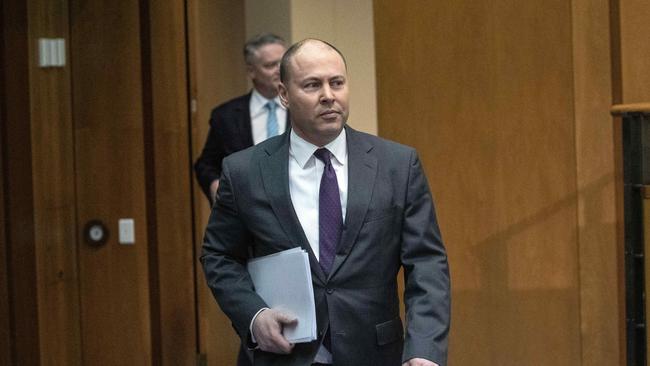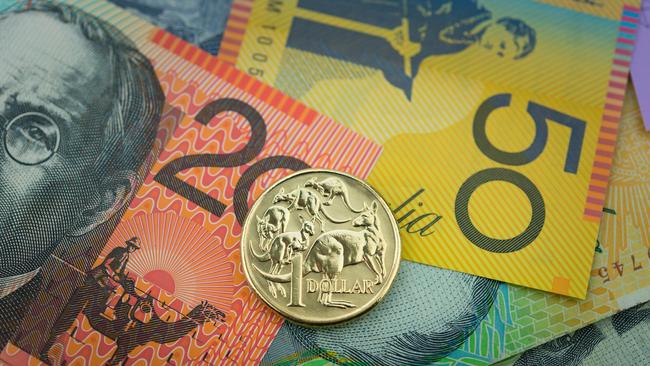Josh Frydenberg announces COVID budget ‘shock’ leaves Australia with $850 billion debt
As the country stares down a deficit of $184.5 billion this financial year, business leaders are demanding bold initiatives to kickstart the economic recovery after the devastating coronavirus crisis.
NSW
Don't miss out on the headlines from NSW. Followed categories will be added to My News.
- Massive budget changes: How it affects your super
- JobKeeper, JobSeeker changes: 15 things you must know
Slashing business red tape, and retaining flexible and innovative work and trading arrangements introduced during the pandemic are key to “growing our way out of debt”, say experts weighing up Australia’s biggest budget black hole in more than 70 years.
As the country stares down a deficit of $184.5 billion this financial year, business leaders are demanding bold initiatives to kickstart the economic recovery after the devastating coronavirus crisis.

Before COVID-19 hit, Treasurer Josh Frydenberg had hoped to preside over a $5 billion surplus for 2019-20, but on Thursday he unveiled the budget was now $85.9 billion in the red — and on track to more than double that by the end of 2020-21.
The huge deficit was fuelled by a $289 billion spend on coronavirus support measures, and an expected $95.6 billion drop in personal income and business tax receipts over two years.
MORE NEWS
Wear a mask: NSW government gets tough on face coverings
PM’s reduced JobKeeper amid more Vic deaths
$2b JobTrainer to keep apprentices employed
Hundreds of thousands of people will lose their jobs in the lead-up to Christmas, with unemployment expected to peak at 9.25 per cent for the December quarter.
Treasury has forecast the jobless rate will sit at about 8.75 per cent by mid 2021.
Mr Frydenberg will use a National Press Club speech on Friday to highlight the importance of the government’s “JobMaker” plan in the next phase of the coronavirus response.
“Our focus will shift to enabling growth,” he will say.
Mr Frydenberg will say Australia does not have the “luxury” of being able to benefit from interest rate cuts and migration to kickstart the economy.
Annual population growth is expected to plummet to just 0.6 per cent in 2020-21 — the lowest rate in more than a century.
“While we will continue to provide fiscal support through the crisis, sustainable growth will only come from creating the most dynamic and flexible economy we possibly can,” Mr Frydenberg will say.
One of Australia’s leading entrepreneurs Gerry Harvey told News Corp that red tape was stifling business and had to be slashed.
Mr Harvey, whose interests span from retail to cucumber farming, said he almost pulled the plug on a large NSW development after the local council demanded $900,000 for a koala sanctuary.
“The red tape and the greed,” the Harvey Norman chairman lamented. “It’s just too difficult to get things done. What I can do in three months in Malaysia takes 14 months here.”

National employer association Ai Group’s CEO Innes Willox said a “terrible opportunity for significant reform” had been created.
“We need to be bold enough to grab it,” he said.
“Governments need to seriously tackle tax reform, workplace relations, regulation — along with skills and training — like never before.”
The federal government is hoping its reforms to the skills and training sector and higher education, ambitious free trade agreements, and investment in manufacturing will drive the country’s economic recovery.
Its deregulation agenda will also consider if the actions taken during the pandemic should be made permanent if they increase competition and productivity.
Retaining some of the sudden changes adopted at the start of the virus outbreak — such as rapid digitisation, flexible working from home arrangements and trading hours are backed by EY Oceania chief economist Jo Masters.

“There are quite a few regulations that we’ve eased in response to COVID-19, such as when supermarkets can receive deliveries, opening hours, restaurants selling takeaway alcohol and work form home, that from my point of view could be retained,” she said.
Ms Masters said reducing red tape, tax and industrial relations reforms that “smooth” the economy will help Australia “grow out of debt”.
Yellow Brick Road founder Mark Bouris called for an immediate three-month inquiry by the government to find out exactly what additional help small businesses needed: “We need a bottom-up solution.”
It comes and S & P Australia yesterday confirmed Australia’s AAA credit rating can “absorb” the growing deficit: “We expect the general government’s fiscal balance to improve during the next few years beyond the large deficit being incurred in fiscal 2021.”
$34K BILL FOR EVERY PERSON
Australia’s debt bill will soar to $34,000 for every person under a best-case scenario with no further coronavirus lockdowns and all borders reopening within months.
New Treasury forecasts show the nation’s gross debt is expected to climb to $851.9 billion this financial year, and will come with a $16.3 billion annual interest bill. This equates to about $636 per Australian in interest each year.
The “eye watering” figures are based on optimistic predictions about how Australia will handle the remainder of the COVID-19 pandemic, with Treasury officials assuming international borders will reopen on January 1 for “low levels” of travel.
The update also assumes greater Melbourne will only be in lockdown for six weeks, with Victoria back to stage three of reopening by mid-December despite the horror second wave of coronavirus gripping the state.
The debt estimate factors in NSW opening its border to Victoria on August 19, and all other state and territory borders opening by mid-September.
Critically the budget figures do not take into account a second COVID-19 wave in other regions, with Treasury acknowledging the reintroduction of lockdowns in some areas would cause a $2 billion hit to the economy every week.
Finance Minister Mathias Cormann fired up yesterday when asked about the huge debt figure, questioning what other options were open to the government in the crisis.
“Are you suggesting that we shouldn’t have provided the support we did to boost our health system, to protect jobs, to protect livelihoods,” he said.
“In the circumstances what was the alternative?”

Westpac’s head of rate strategy Damien McColough said the economic statement implied the Government expects to pay 0.8 per cent for its future borrowings.
In December, the government had been anticipating interest costs of 1.1 per cent and was paying more than 2.5 per cent as recently as 2018.
“The Government’s borrowing requirement estimates would be at the lower end of market expectations and so should be favourably received,” Mr McColough said.
Prior to the new numbers from Treasury, Westpac had been expecting government gross debt to reach $1 trillion by the end of this financial year.
Treasurer Josh Frydenberg flagged the government would seek to raise Australia’s current borrowing limit of $850 billion, acknowledging that ceiling will soon be breached.
“We will revisit that in the Budget,” he said.
Net debt will rise to $677.1 billion this financial year.
Mr Frydenberg said the return of international travellers, particularly students, would help pay off some debt — but the time frame is not clear on when that will occur.
“Now that is work that we have been undertaking but, of course, the environment with respect to the coronavirus is very fluid.”
